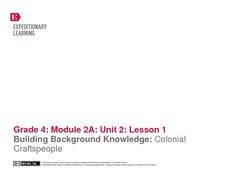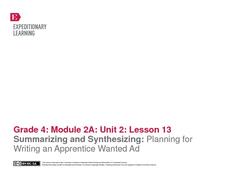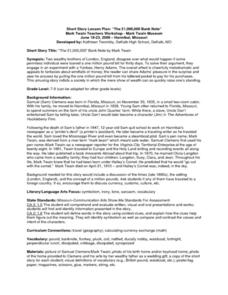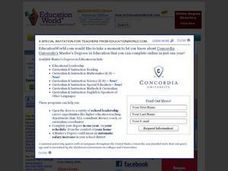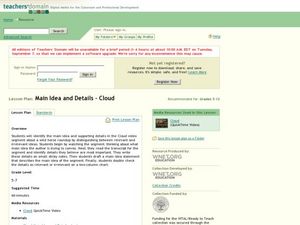EngageNY
Reading and Taking Notes on Colonial Trades
In the tenth instructional activity of this unit, young scholars learn to categorize information as they continue researching their colonial trade. During guided practice, the teacher models how to read informational text slowly while...
Curated OER
Using Details From The Text
Begin this expository writing activity by reading a non-fiction book of your choice and modeling expository writing. The plan suggests The Trip of a Drip by Vicki Cobb but notes that other texts will work. Learners then choose a...
Curated OER
A Seashell Lesson: Writing for Detail and the Scientific Process
Practice descriptive language in this lesson, which prompts elementary and middle schoolers to write detailed descriptive sentences describing a seashell. They write a description of a shell, create an illustration, and other students...
EngageNY
Close Reading of Bullfrog at Magnolia Circle: Main Ideas about the Bullfrog
As your class reaches the end of the book Bullfrog at Magnolia Circle, the seventh lesson in this literary unit helps third graders transition from reading narrative to expository writing. Scholars develop their note-taking skills...
EngageNY
Building Background Knowledge: Colonial Craftspeople
In the first lesson plan of this unit on colonial trade, fourth graders gain background knowledge of different jobs performed by early colonists. The class begins with a slide show presentation that includes a variety of great...
EngageNY
Mid-Unit Assessment: Close Reading of Bullfrog at Magnolia Circle: Bullfrog Life Cycle
The sixth lesson plan in this Bullfrog at Magnolia Circle unit assesses your third graders' ability to read and understand informational text. The included assessment asks learners to take notes about the main idea and supporting...
EngageNY
Summarizing and Synthesizing: Planning for Writing an Apprentice Wanted Ad
In instructional activity 13 of this unit on colonial trade, young researchers learn about apprentices as they prepare to write help-wanted ads for the specific trade they have been researching. To begin, the class listens closely as the...
Curated OER
Is That a Fact?
Investigate popular scientific claims and gather evidence to defend or argue against an author's stance. Writers synthesize information and compose their own "Really?" columns modeled after those found in the weekly "Science Times"...
Curated OER
Red Dirt Groundbreakers
Discover Oklahoma's first farmers. Read about 14 different agriculture workers and their contribution to Oklahoma's farming. After reading, have your class complete several activities such as researching an agriculturist, writing a...
Curated OER
"The 1,000,000 Pound Bank Note" by Mark Twain
Compare real events from Mark Twain's life to events in the story. Middle school readers identify point-of-view, its purpose, and its reliability by citing two examples. They describe the tone of the story using four examples and...
Curated OER
Pizza Biography
A biography writing lesson with a tasty twist! Kids create a "visual biography" in which each pizza slice represents a paragraph, and toppings represent supporting details. They learn research techniques, note-taking skills, and how to...
Polk Bros Foundation
Answer the BIG Question with Cited Examples and Evidence
Close up your unit of study with an examination of one of the guiding or essential questions as it relates to what your class has studied and other research. Class members first write down the question. Then they note down information...
Curated OER
The Personal Narrative - Part 3
Let's peer edit! Have your writers exchange their personal narratives with another learner! While peer editing, they will look for any missing information and identify strong details. They can practice literary analysis skills using a...
Curated OER
Let's Get it Together! Reading to Learn
Let’s learn about frogs! Young readers are led through “Freaky Frogs,” a non-fiction article. Teach learners how to edit an article so there are fewer details to sift through. After talking through the article, they learn the six steps...
Curated OER
Note Taking By Crayon
Skim a brief biography of Amelia Earhart with your class, and then assign groups of researchers one of four topics listed: Amelia's family life, important airplane flights during Amelia's life, turning points in Amelia's life, and...
Curated OER
Main Idea and Details-Cloud
Students distinguish between main idea and details. In this writing process lesson plan, students use a video on horses to learn about note-taking. They write details from the video on sticky notes, and then determine which...
Curated OER
Sticky Note Reading Lesson
Fourth graders read about Indiana's history and use sticky notes to record important information. In this sticky notes lesson, 4th graders record cultural information about the people of Indiana.
Curated OER
Narrative Nuts and Bolts
After viewing slides and reading about child labor, young authors compose an original narrative story. They practice note-taking skills and work to effectively engage a reader by incorporating plot, logical order, complex characters,...
Curated OER
Reading Examples
Young writers read excerpts from Gary Paulsen's memoir to identify figurative and literal language that contain sensory details. They determine which selections are examples of sensory language and fi the language is used literally or...
Curated OER
Listening To a Guest Speaker
Pupils review the main points of note-taking to summarize the content of a formal or informal spoken presentation. They hear a guest speaker talk about a pre-arranged topic and take notes during the presentation. Next, they write a...
EngageNY
Grade 10 ELA Module 3: Unit 1, Lesson 11
Have you had a change of heart? Scholars consider whether their views change after gaining new information about tissue ownership. They read John Moore's court hearings and respond to a quick write prompt, noting if the new information...
Curated OER
Outlining Main Ideas and Details
Begin at the end. Present your class with an expository essay and ask them to create an outline of the article, paying particular attention to the main ideas and the details supporting these ideas. After a discussion of what they have...
Florida Department of Health
Understanding the Risk of Substance Abuse Unit
Teenage brains are different! Understanding that the teenage brain is still developing and thus more impacted by substance abuse is the key concept in a three-lesson high school health unit. Participants learn about how the brain and...
Curated OER
Researching the Past
Learners research the western movement in order to learn note taking strategies with nonfiction texts. They use the Internet to search for important information about the western movement using the Cornell Notes note-taking system. They...
Other popular searches
- Example of Noting Details
- Activities in Noting Details
- Noting Details Grade 1
- Worksheets in Noting Details
- Noting Details Worksheet
- Noting Details Examples
- Noting Details Grade 5
- Noting Details Grade 2
- Noting Details Language Arts
- Guidelines in Noting Details
- Act Test Noting Details




